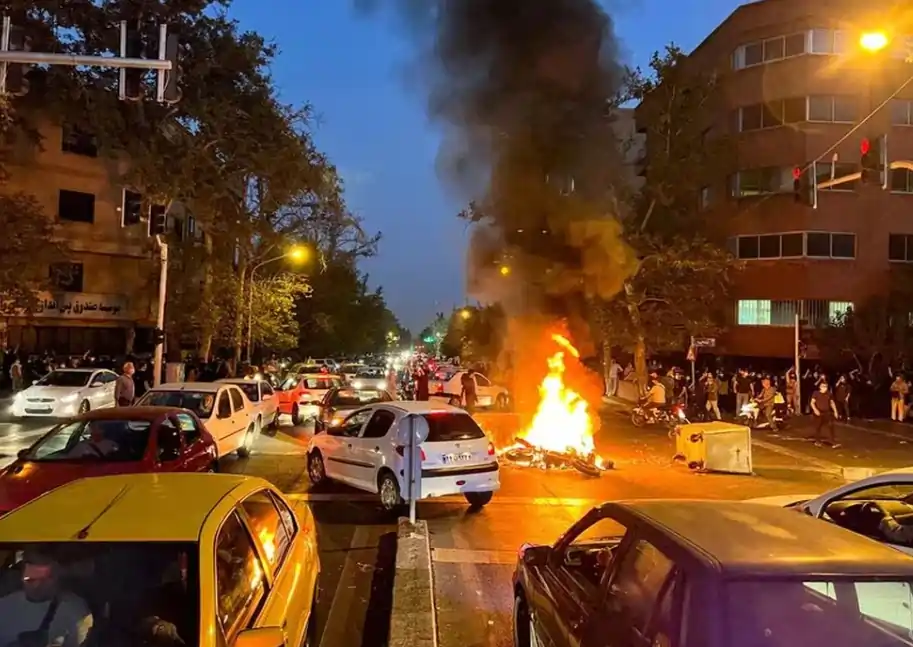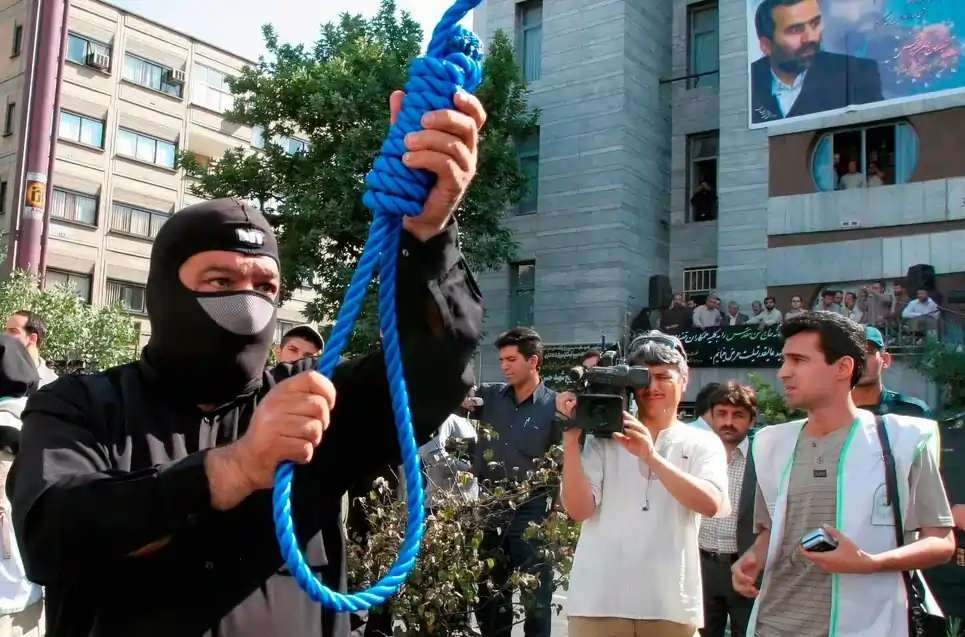- Iran executions 2023: rising death sentences
- Iran Human Rights report on executions and death penalties
- Drug-related executions in Iran: statistics and concerns
- Protests in Iran and crackdown by Revolutionary Guards
- World leaders’ open letter on Iran’s human rights violations

FILE PHOTO: A police motorcycle burns during a protest over the death of Mahsa Amini, in Tehran, Iran, September 19, 2022. WANA (West Asia News Agency) via REUTERS
At least 576 were executed in 2022, well above the 314 in 2021. “The death penalty is used to generate social fear and prevent further protests,” lamented the NGO Iran Human Rights
Iran’s regime carried out more than 350 death sentences in the first six months of the year, mostly on drug-related charges, according to Norway-based NGO Iran Human Rights.
“At least 354 people, including six women, have been executed in the first six months of 2023″, the group highlighted in a report that underlines that 206 of these executions are related to drug offenses, an increase of 126 percent over the same period last year. The NGO denounces that the authorities only reported 43 executions, 12 percent of the total.
As many as 71 people – 20 percent – of those executed belonged to the Baloch minority, a mainly Sunni ethnic group that resides mainly in the province of Baluchistan, near the border with Pakistan.
This province was the target of intense operations by the Revolutionary Guards during the harsh crackdown on protests in September last year. Hundreds of Baloch were killed in Revolutionary Guard actions in Zaheda and Jash.
At least 576 people were already executed last year, well above the 314 inmates executed in 2021. For this year Amnesty International has already counted 282 executions, according to its own tally. “The death penalty is used to generate social fear and prevent further protests,” lamented Iran Human Rights director Mahmud Amiri-Moghaddem.
“Most of the dead are low-cost victims for the killing machine: drug defendants from the most marginalized communities,” he added. Amnesty openly called these executions a “war on the poor.”
Allegations of crimes against humanity
In May, at least 107 former world leaders signed an open letter in support of Iran’s pro-democracy protesters and demanded that the Revolutionary Guards (IRGC) be blacklisted.
The initiative is being carried forward by world leaders representing 45 nations.
Also in May, Iran’s regime executed three men convicted of participating in protests over the death of Mahsa Amini last year, drawing condemnation from Western governments.
The collective letter from 107 former heads of state called on the leaders of Canada, the EU, the UK and the US to hold the “leadership of the Islamic Republic of Iran accountable for its crimes.”
“We encourage you to stand in solidarity with the people of Iran in their desire for a secular and democratic republic where no individual, regardless of religion or birthright, has any privilege over others. Through their slogans, the Iranian people have made it clear that they reject all forms of dictatorship, whether that of the deposed Shah or the current theocratic regime, and therefore reject any association with either of them,” the open letter states.
“We believe that it is up to the Iranian people to decide their future. However, we recognize that for four decades, the democratic coalition National Council of Resistance of Iran (NCRI) has consistently and tirelessly pursued democratic change. In this regard, we believe that the Ten Point Plan articulated by NCRI President Ms. Maryam Rajavi deserves support. Her commitment to free elections, freedom of assembly and expression, abolition of the death penalty, gender equality, separation of religion and state, autonomy for Iran’s ethnicities, and a non-nuclear Iran is in line with our own democratic values,” the letter states.
Signatories to the letter include 50 former presidents, 47 former prime ministers, one former chancellor and nine other former heads of state from around the world. Two former presidents of the European Commission and three Nobel Peace Prize laureates are among those who initialed the letter.
The European signatories include the former prime ministers of the United Kingdom, France, Italy, Poland, Spain and Ukraine. In South America, they include the former presidents of Argentina, Chile, Colombia, Costa Rica and Mexico and two former secretaries general of the Organization of American States (OAS). Other signatories include two former prime ministers of Canada.

